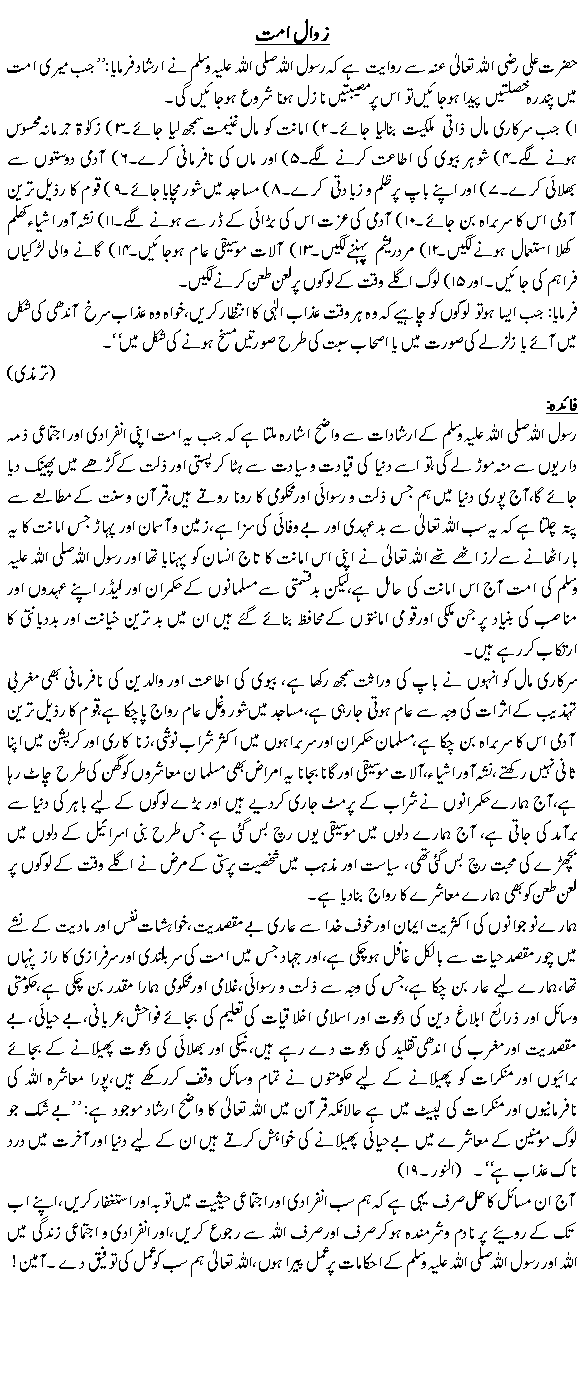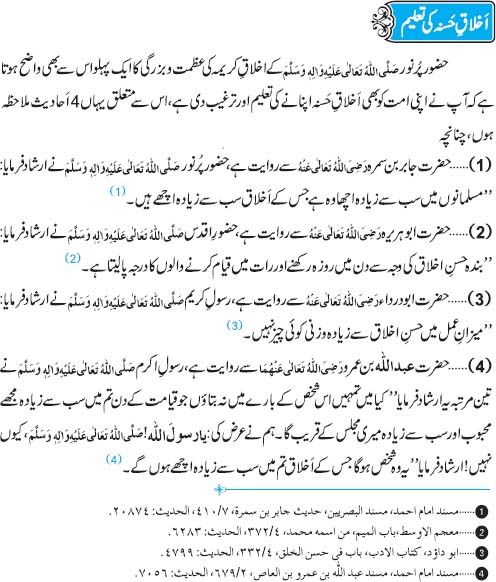
Hadith: Zawal-e-Ummat
TAG: Hadith
Qayamat Kay Ahwal Hadith Ki Roshni Mein

Qayamat Kay Ahwal Hadith Ki Roshni Mein
Naseehat Ki Chand Aham Baatein

Hadees e Nabwi S.A.W: Naseehat Ki Chand Aham Baatein
Moat Kay Barey Mein Frameen Rasool (S.A.W)

Moat Kay Barey Mein Frameen Rasool (S.A.W)
Hazrat Abu Darda RA Ka Pass Hadith Kay Liay Jana

Hazrat Abu Darda RA Ka Pass Hadith Kay Liay Jana
Abdullah Ibn Masud (RA) Ki Ahtiyat Rawayat e Hadith Mein

Abdullah Ibn Masud (RA) Ki Ahtiyat Rawayat e Hadith Mein
Wise Sayings From Hadith
1) Narrated `Ali (RA): The Prophet (PBUH) said, “Do not tell a lie against me for whoever tells a lie against me (intentionally) then he will surely enter the Hell−fire.” [Bukhari 1/106]
2) Narrated Abu Huraira(RA): The Prophet(PBUH) said, “Religion is very easy and whoever overburdens himself in his religion will not be able to continue in that way. So you should not be extremists, but try to be near to perfection and receive the good tidings that you will be rewarded; and gain strength by worshiping in the mornings, the nights.”
[Bukhari 1/38]
3) Narrated Al−Mughira(RA): The Prophet (PBUH) said, “Allah has forbidden you
(1) to be undutiful to your mothers
(2) to withhold (what you should give) or
(3) demand (what you do not deserve), and
(4) to bury your daughters alive. And Allah has disliked that
(A) you talk too much about others
(B), ask too many questions (in religion), or
(C) waste your property.” [Bukhari 8/6]
4) “He who does not thank people does not thank Allah.”Hadith – Tirmidhi 1877, Saheeh: Related by and at-Tirmidhee (no. 1877) and Aboo Daawood (no. 4177). It was declared authentic by Imam al-Albaanee in as-Saheehah (no. 417)
5) Narrated Adi bin Hatim heard the Prophet(PBUH) saying: “Save yourself from Hellfire even by giving half a date fruit in charity.” [Bukhari 2/498]
6) Narrated Abu Huraira(RA): The Prophet(PBUH) said, “Whoever established prayers on the night of Qadr out of sincere faith and hoping for a reward from Allah, then all his previous sins will be forgiven; and whoever fasts in the month of Ramadan out of sincere faith, and hoping for a reward from Allah than all his previous sins will be forgiven.” [Bukhari 3/125]
7) Narrated Abu Huraira(RA): The Prophet(PBUH) said, “Whoever believes in Allah and the Last Day should not hurt (trouble) his neighbor. And I advise you to take care of the women, for they are created from a rib, and the most crooked portion of the rib is its upper part; if you try to straighten it, it will break, and if you leave it, it will remain crooked, so I urge you to take care of the women.” [Bukhari 7/114]
8) Narrated Abu Huraira (RA): Allah’s Apostle (PBUH) said, “Anybody who believes in Allah and the Last Day should not harm his neighbor and anybody who believes in Allah and the Last Day should entertain his guest generously and anybody who believes in Allah and the Last Day should talk what is good or keep quiet. (i.e. abstain from all kinds of evil and dirty talk).” [Bukhari 8/47]
9) Abu Huraira (RA) reported Allah’s Messenger (may peace be upon him) as saying: The world is a prison−house for a believer and Paradise for a non−believer.[Muslim 42/7058]
10) Abu Huraira (RA) reported Allah’s Messenger(PBUH) said: There is a bone in the human being which the earth would never consume and it is from this that new bodies would be reconstituted (on the Day of Resurrection). They said: Allah’s Messenger, which bone is that? Thereupon he said: It is the spinal bone. [Muslim 41/705]
11) The son of Abu Said al−Khudri reported on the authority of his father that Allah’s Messenger (may peace be upon him) said: When one of you yawns, he should keep his mouth shut with the help of his hand, for it is the devil that enters therein. [Muslim 42/710]
Khatma Bil Khair Aur Hadith

Khatma Bil Khair Aur Hadith
Satan Eats And Drinks With His Left Hand
[Sahih Muslim: Volume 3, Book 23, Number 5007] Jabir b. ‘Abdullah (Radi Allah Anhu) reported Allah’s Messenger (sal-allahu- alleihi-wasallam) having said: “Do not eat with your left hand, for Satan eats with his left hand.”
[Sahih Muslim: Volume 3, Book 23, Number 5008] Ibn ‘Umar (Radi Allah Anhu) reported Allah’s Messenger (sal-allahu- alleihi-wasallam) as saying: “When any one of you intends to eat (meal), he should eat with his right hand. and when he (intends) to drink he should drink with his right hand, for Satan eats with his left hand and drinks with his left hand.”
[Sahih Muslim: Volume 3, Book 23, Number 5010] Salim (Radi Allah Anhu), on the authority of his father, reported Allah’s Messenger (sal-allahu- alleihi-wasallam) as saying: “None of you should eat with his left hand and drink with that (left hand), for the Satan eats with left hand and drinks with that (hand). Nafi’ has made this addition in that:” Do not take up anything with that (left hand) and do not give anything with that.”
[Sahih Muslim: Volume 3, Book 23, Number 5012] ‘Umar b. Abu Salama (Radi Allah Anhu) reported: I was under the care of Allah’s Messenger (sal-allahu- alleihi-wasallam), and as my hand used to roam about in the dish he said to me: “Boy, mention the name of Allah, and eat with your right hand and eat from what is near to you.”
Our Lord! accept from us; surely Thou art the Hearing, the Knowing.
Ikhlaq e Hasna Ki Taleem

Ikhlaq e Hasna Ki Taleem

